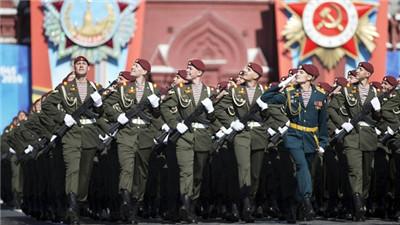(单词翻译:单击)
May 1 was a glorious spring day in Pskov. Young people roller-skated or lounged on the banks of the Velikaya river. But 14-year-old Vladimir instead chose to spend the day standing vigil at a war memorial.
5月1日的普斯科夫(Pskov)沐浴在春日的明媚阳光下。年轻人或是滑旱冰,或是躺卧在韦利卡亚河(Velikaya)岸边。但14岁的弗拉基米尔(Vladimir)选择在这一天值守一座战争纪念碑。
Every 10 minutes, he and eight fellow camouflage-clad members of a local patriotic club took turns goose-stepping in front of an eternal flame and an anti-aircraft gun battery used in 1941, when the town in northwestern Russia defended itself against attack by Nazi Germany.
每隔10分钟,他与当地爱国俱乐部另外8名身着迷彩服的成员轮流在一团永恒火焰和一门多管高射炮前走正步。1941年,这门高射炮曾被这座俄罗斯西北小城用来抵抗纳粹德国的进攻。

“We must remember,” said Maria Semyonova, a teacher who oversaw the youngsters’ changing of the guard. “A nation must know its heroes.”
“我们必须铭记,”负责监督这些年轻人换岗的教师玛丽娅•谢苗诺夫(Maria Semyonova)说,“一个民族必须了解自己的英雄。”
Seventy years after Nazi Germany’s capitulation, Moscow is gearing up for the biggest commemoration in decades of what it calls the Great Patriotic War, with a huge military parade on Red Square on May 9.
纳粹德国投降70年后,俄政府正在为其所称的伟大卫国战争(Great Patriotic War)筹备一场几十年来最大规模的纪念活动,包括5月9日在红场(Red Square)举行的盛大阅兵仪式。
Outside Russia, many are watching the elaborate anniversary celebrations with mixed feelings and fear that Vladimir Putin’s government is exploiting the event to underpin its narrative of a Russia under attack from a hostile west.
在俄罗斯以外,许多人怀着复杂的心情观察这场精心准备的周年庆典,他们担心弗拉基米尔•普京(Vladimir Putin)领导的政府正在利用这场活动强化自己的叙述,即俄罗斯遭到了怀有敌意的西方的攻击。
But for Moscow, Victory Day helps unite a Russian nation that has been struggling to define its national identity since the collapse of the Soviet Union in a way that other anniversaries do not. More than 25m Soviet citizens died in the war, and there is barely a family without direct and personal links to the conflict.
但对莫斯科而言,胜利日周年庆典有助于把自苏联解体后一直在艰难寻找国家认同的俄罗斯民族团结起来,这是其它周年纪念活动做不到的。逾2500万苏联公民死于二战期间,几乎每个家庭都与这场战争有着直接和个人的关联。
“That victory is the only thing everyone can relate to and agree upon,” said Elena Chernenko, foreign affairs columnist at the Kommersant newspaper.
俄罗斯《生意人报》(Kommersant)撰写外交事务的专栏作家叶连娜•契尔年科(Elena Chernenko)称:“那场胜利是唯一大家都能感同身受且意见相同的事。”
Memories of the conflict are most vivid in western Russia, location of Germany’s eastern front. Large parts of the area stretching several hundred kilometres east of the border were under German occupation between 1941 and 1944 and saw some of the country’s bloodiest fighting.
俄罗斯西部的人民对这场战争的记忆最为刻骨铭心,当年这里是德国的东部战线。1941年至1944年期间,这里的大片地区——自边界向东绵延数百公里——曾被德国占领,见证了多场苏联境内最血腥的战役。
In Litovo, a tiny village some 100km southeast of Pskov, a group of middle-aged men and women last week were cleaning a war monument while swapping wartime stories heard from their parents and grandparents.
在普斯科夫东南方向约100公里处的小村Litovo,上周一群中年男女一边打扫一座战争纪念碑,一边分享自己从父母和祖父母那里听来的战时故事。
“This was a scary place because the Germans were right here,” said a woman named Anastasia, as she gave a stele with the names of fallen Soviet soldiers a fresh coat of white paint. She recounted how German military police had set up their local headquarters at Altun, an estate abandoned by its aristocratic owners in the 1917 revolution.
“这是一个可怕的地方,因为德国人当时就驻扎在这里,”一位名叫阿纳斯塔西娅(Anastasia)的妇女说。她边说,边给刻有阵亡苏联士兵名字的石碑刷上一层新的白漆。她讲述了德国宪兵如何在Altun——1917年革命期间被贵族主人抛弃的庄园——设立他们的地方总部。
“They were always hunting for partisans in the woods, and they would randomly arrest villagers and accuse them of helping people from the underground,” she said.
“他们总是在丛林里追捕游击队员,还随意地抓捕村民,指控他们暗中帮助地下组织,”她说。
Today the region is slowly losing its population. Deserted wooden farm cottages are collapsing and fallow farmland is transforming back into bog. But the countless war monuments dotting the landscape are immaculate.
如今,这一地区的人口正在缓慢流失。废弃的木质农舍摇摇欲坠,无人耕种的农田正在变回沼泽。但镶嵌在这片大地上的无数战争纪念碑得到精心守护。
One of them, on a remote moor, commemorates the shooting of more than 300 civilians by German forces — just one sign of the many killings and deportations that took place in this area, according to Wehrmacht diaries and Nuremberg trial records.
其中一座立于偏僻荒野的纪念碑纪念的是被德军射杀的300多名平民。根据德意志国防军(Wehrmacht)日记以及纽伦堡审判(Nuremberg trial)记录,这只是发生在这一地区的诸多屠杀和驱逐事件的标记之一。
A group of men 50km away were busy expanding an old memorial to more than 2,500 Soviet soldiers who died on a ridge here during fighting when the German military invaded in 1941 and again when it retreated.
在50公里外的另一个地方,一群男人正忙着扩建一座旧纪念碑,使其包括2500多名阵亡的苏联士兵。德军1941年入侵以及后来撤退时,他们在这里的一个山脊上战死。
The men have built a miniature Kremlin wall around the few graves and a simple white obelisk. “Earlier, only the Latvian soldiers were commemorated, but now we have added everyone else,” said Kamzin Zhumabek Zhekenuly, a Kazakh official who was touring the region’s memorials in a van embellished with Russia’s official Victory Day logo — a war medal and a St George’s ribbon. “We built seven new monuments around here this week,” he said.
这些男子围绕寥寥几个坟墓建造了微型的克里姆林宫式的围墙,还有一座简单的白色方尖碑。“早些时候,只有拉脱维亚士兵被纪念,但现在我们把其他所有人都加了进来,”哈萨克族官员Kamzin Zhumabek Zhekenuly说。他乘坐一辆装饰有俄罗斯官方胜利日标志——一枚战争勋章和一条“圣乔治丝带”——的面包车,巡视着这一地区的纪念碑。“本周我们在这个地区建造了七座新纪念碑,”他说。
The lack of international recognition for the high price the Red Army paid in its role as a liberator of Europe rankles with Russians.
对于当年苏联红军付出高昂代价解放欧洲却没有得到相应的国际认可,令俄罗斯人耿耿于怀。
A poll by British company ICM Research for Sputnik, the Russian state media outlet, last month found that only 13 per cent of British, French and Germans believe that the Red Army liberated Europe from fascism, while 43 per cent named the US Army.
英国ICM Research公司上月为俄罗斯官方媒体Sputnik所做的民意调查显示,只有13%的英国人、法国人以及德国人认为是苏联红军将欧洲从法西斯主义的魔爪下解放出来,而43%的受访者认为这是美军的功劳。
While this partly reflects the fact that liberation from the Nazis was quickly followed by the imposition of Soviet control over central and eastern Europe, it angers many in Moscow. Sergei Ivanov, Mr Putin’s chief of staff, said last week he was concerned that western politicians “purposely try to rewrite history”.
尽管这在一定程度上反映了苏联在击败纳粹后很快对中欧和东欧实施铁腕控制的事实,但这一点仍激怒莫斯科的许多人。普京的幕僚长谢尔盖•伊万诺夫(Sergei Ivanov)上周表示,他担心西方政界人士“试图故意改写历史”。
It is a view that is popular among ordinary Russians. Ms Semyonova tells her students how her grandfather witnessed a German officer shooting a Russian girl to end a quarrel between two of his soldiers over who should have her.
这种观点在普通俄罗斯人中相当普遍。教师谢苗诺夫告诉她的学生,她的祖父亲曾目睹一名德国军官枪杀一位俄罗斯姑娘,只是为了让他手下的两名士兵停止为了谁该拥有那个女孩而争吵。
“My grandfather said that to make sure this kind of thing would stop,he was ready to fight to the last,” she said. “Enabling all of us to live freely.
“我祖父说,为了确保此类事情不再发生,他准备战斗到最后,”她说。“让我们所有人能过上自由、和平的生活是他这一代人最伟大的贡献,这值得纪念。”


